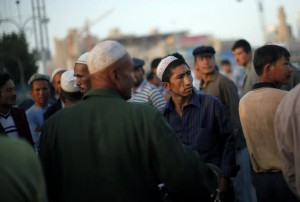Chinese police kill Uighur man who “charged” station queue with brick
Reuters, 17 June 2015
Reuters Beijing – Police at a train station in the Chinese city of Xian shot an ethnic Uighur man who had charged into a ticket line holding a brick, police said on Wednesday, adding the man later died.
Public sensitivity to security at China‘s railway stations has increased following a series of incidents including a mass stabbing at a train station last year in the southwestern city of Kunming that left 31 dead.
Authorities said that was carried out by separatist militants from the far western region of Xinjiang, home to the Muslim Uighur people, who speak a Turkic language.
In a brief statement on its official microblog, the railway police in Xian said that at about 6 a.m. a Uighur man holding a brick “charged into” a line of people waiting to buy tickets.
“On duty police quickly got to the scene to stop (him), and after repeated warnings were ignored opened fire and injured (him),” police said.
The man died of his wounds in hospital, police said, adding the situation had returned to normal at the station.
The statement was later amended without explanation to remove reference to the man’s ethnicity.
Police provided no other details. Xian is a popular tourist destination as it is close to the famous Terracotta Army.
A picture on state television’s microblog showed a body on the ground, which had been pixelated out, on what looked like a square in front of the station with the old city walls behind it. The body was surrounded by police, two of whom carried riot shields.
This week is the beginning of the Muslim holy month of Ramadan, a sensitive time in Xinjiang especially following an increase in deadly attacks blamed by Beijing on Islamist militants over the past three years in which hundreds have died.
China has about 20 million Muslims spread throughout the country, only a portion of whom are Uighur.
Exiled Uighur groups and human rights activists say the government’s repressive policies in Xinjiang, including restrictions on religious practices, have provoked unrest.
The government denies that.
(Reporting by Ben Blanchard; Editing by Jeremy Laurence, Robert Birsel)


